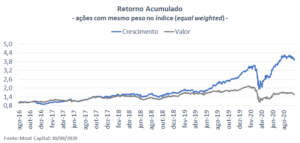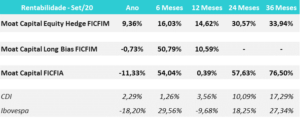Letter to investors – 3rd quarter 2020
Dear shareholders,
We reached the end of the 3rd quarter and after 4 months of expressive highs (from April to July), the Brazilian stock market showed a strong correction, detaching itself from its peers, with one of the worst performances of the quarter.
The main debate among market agents is about the country’s fiscal sustainability. Brazil faced the pandemic by sharply increasing public spending in order to minimize socioeconomic impacts. Now, understanding that we are nearing the end, or at least a more controlled situation of the epidemic, as a result of treatments and vaccines, the time has come to deal with the consequences of this fiscal movement.
Currently, the spending ceiling is the main anchoring factor for long-term interest rates. As the legislative and executive powers give mixed signals about the direction of fiscal conduct, markets react negatively by raising the cost of capital and, consequently, demanding a higher premium for risky assets.
On the positive side, we see a solid and strong economic recovery. Both the macro indicators, such as industrial production, consumption and credit, as well as the sectorial indicators that we monitor, indicate that the 3rd quarter showed a notable recovery in activity, even in the sectors most affected by the pandemic.
There is always the argument that the economic improvement is due to government stimulus and that its duration is short and therefore the improvement will not be sustainable. However, we can argue with the fact that many activities are not yet operating at full capacity and the economy is still in the process of reopening.
Between growth and the cost of capital, the latter has prevailed in stock market pricing, since despite the short-term interest being 2% p.a., we have observed a significant correction in the long-term curve. The current price of assets tells us that the country will not show growth, a fact that we disagree with, which is precisely where we see a very interesting asymmetry.
After the shock of the pandemic, countries entered an expansionary fiscal regime and the world’s central banks reduced interest rates to zero or very low levels, as discussed in the last letter. The “novelty” was that the monetary authorities have been stressing that this level should last for a long period. Therefore, even though the Brazilian fiscal challenge requires a higher interest rate to rollover the debt, we still have historically very low interest rates. Brazil will experience a sufficiently long period of negative real interest rates, which should provide significant growth. We see that the Brazilian stock market, at current prices, suggests that the spending ceiling will be abandoned and that we will see very low growth ahead. Thus, we understand that there is a price asymmetry that can be compared to the end of the 2015 cycle.
During the quarter, a discrepancy in behavior was also consolidated between the sectors of the stock exchange, where those most benefited by the pandemic, such as e-commerce, software and technology, stood out, growing at a faster rate than the rates they had been showing before the crisis. These companies are getting higher premiums, decreasing the expected future return. On the other hand, the most affected sectors, such as services, airlines, tourism, apparel and commercial properties, in addition to being severely affected, also suffered a large impact on prices, increasing the expected return.
It is precisely at this point that we would like to emphasize that the majority of assets on the stock exchange in Brazil predominantly fall into the category of assets that lost premium. Banks and most commodity producers make up around 50% of the Bovespa index.

Paradoxically, the Brazilian stock market performed worldwide this quarter, but registered R$94bn of offers this year, not considering in this amount all the secondary offers led mainly by BNDES, which has been divesting its extensive stock portfolio.
In the field of risks, we see that both the world economy and, especially, the Brazilian economy are much more subject to possible shocks than in the past. It will take time to digest all the fiscal effort made this year.
The world remains very uncertain. Especially the American elections, still undefined, can bring direct changes in the pricing of assets, either through raising taxes or, specifically for Brazil, new chapters in the US-China relationship.
In summary, our opinion is that Brazilian asset prices embody a significant rise in interest rates and incorporate a very low implicit growth in value sectors that were most affected by the pandemic, making risk-taking for stock market assets very attractive, even if the environment looks uncertain in the short term.

The profitability obtained in the past does not represent a guarantee of future results. Investments in funds are not guaranteed by the administrator or by any insurance mechanism, or even by the credit guarantee fund.
Graciously,
Moat Capital